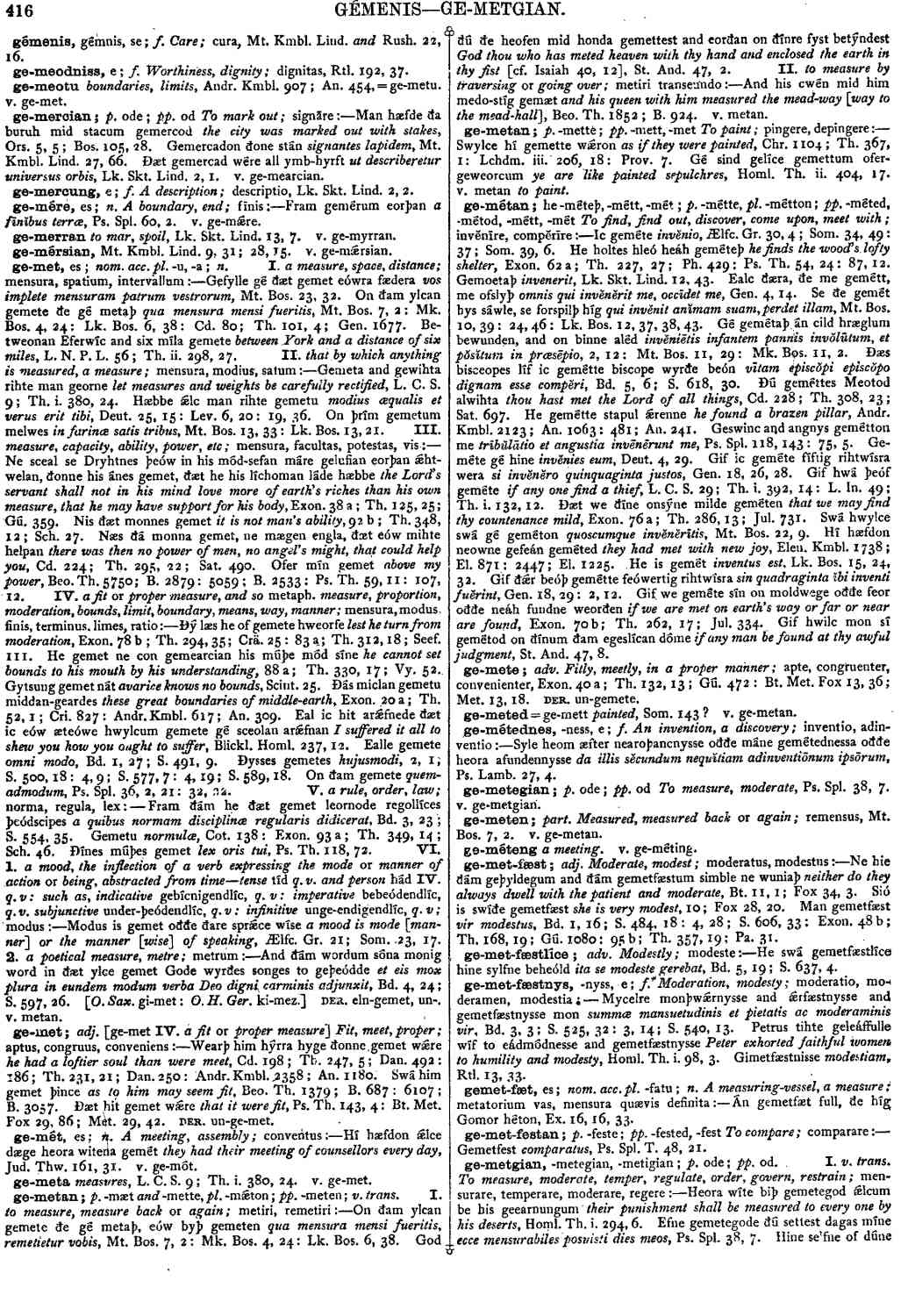ge-met
- noun [ neuter ]
-
Gefylle gé ðæt gemet eówra fædera
vos implete mensuram patrum vestrorum,
- Mt. Bos. 23, 32.
-
On ðam ylcan gemete ðe gé metaþ
qua mensura mensi fueritis,
- Mt. Bos. 7, 2: Mk. Bos. 4, 24: Lk. Bos. 6, 38: Cd. 80; Th. 101, 4; Gen. 1677.
-
Betweonan Eferwíc and six míla gemete
between York and a distance of six miles,
- L. N. P. L. 56; Th. ii. 298, 27.
-
Gemeta and gewihta rihte man georne
let measures and weights be carefully rectified,
- L. C. S. 9; Th. i. 380, 24.
-
Hæbbe ǽlc man rihte gemetu
modius æqualis et verus erit tibi,
- Deut. 25, 15: Lev. 6, 20: 10, 36.
-
On þrím gemetum melwes
in furinæ saris tribus,
- Mt. Bos. 13. 33: Lk. Bos. 13, 21.
-
Ne sceal se Dryhtnes þeów in his mód-sefan máre gelufian eorþan ǽhtwelan, ðonne his ánes gemet, ðæt he his líchoman láde hæbbe
the Lord's servant shall not in his mind love more of earth's riches than his own measure, that he may have support for his body,
- Exon. 38 a; Th. 125, 25; Gú. 359.
-
Nis ðæt monnes gemet
it is not man's ability,
92 b;- Th. 348, 12; Sch. 27.
-
Næs ðá monna gemet, ne mægen engla, ðæt eów mihte helpan
there was then no power of men, no angel's might, that could help you,
- Cd. 224; Th. 295, 22; Sat. 490.
-
Ofer mín gemet
above my power,
- Beo. Th. 5750; B. 2879: 5059; B. 2533: Ps. Th. 59, 11: 107, 12.
-
Ðý læs he of gemete hweorfe
lest he turn from moderation,
- Exon. 78 b; Th. 294, 35; Crä. 25: 83 a; Th. 312, 18; Seef. 111.
-
He gemet ne con gemearcian his múþe mód síne
he cannot set bounds to his mouth by his understanding,
88 a;- Th. 330, 17; Vy. 52.
-
Gytsung gemet nát
avarice knows no bounds,
- Scint. 25.
-
Ðás miclan gemetu middan-geardes
these great boundaries of middle-earth,
- Exon. 20 a; Th. 52, 1; Cri. 827: Andr. Kmbl. 617; An. 309.
-
Eal ic hit arǽfnede ðæt ic eów æteówe hwylcum gemete gé sceolan arǽfnan
I suffered it all to shew you how you ought to suffer,
- Blickl. Homl. 237, 12.
-
Ealle gemete
omni modo,
- Bd. 1, 27; S. 491, 9.
-
Ðysses gemetes
hujusmodi,
- 2, 1; S. 500, 18: 4, 9; S. 577, 7: 4, 19; S. 589, 18.
-
On ðam gemete
quemadmodum,
- Ps. Spl. 36, 2, 21: 32, 22.
-
Fram ðám he ðæt gemet leornode regollíces þeódscipes
a quibus normam disciplinæ regularis didicerat,
- Bd. 3, 23; S. 554, 35.
-
Gemetu
normulæ,
- Cot. 138: Exon. 93 a; Th. 349, 14; Sch. 46.
-
Ðínes múþes gemet lex oris tui, Ps. Th. 118, 72. VI. 1. a mood, the inflection of a verb expressing the mode or manner of action or being, abstracted from time-tense tíd q.v. and person hád IV. q.v: such as, indicative gebícnigendlíc, q.v: imperative bebeódendlíc, q.v. subjunctive under-þeódendlíc, q.v: infinitive unge-endigendlíc, q.v; modus Modus is gemet oððe ðare sprǽce wíse
a mood is mode [manner] or the manner [wise] of speaking,
- Ælfc. Gr. 21; Sm. 23, 17.
-
And ðám wordum sóna monig word in ðæt ylce gemet Gode wyrðes songes to geþeódde
et eis mox plura in eundem modum verba Deo digni, carminis adjunxit,
- Bd. 4, 24; S. 597, 26.
Bosworth, Joseph. “ge-met.” In An Anglo-Saxon Dictionary Online, edited by Thomas Northcote Toller, Christ Sean, and Ondřej Tichy. Prague: Faculty of Arts, Charles University, 2014. https://bosworthtoller.com/15217.
Checked: 0